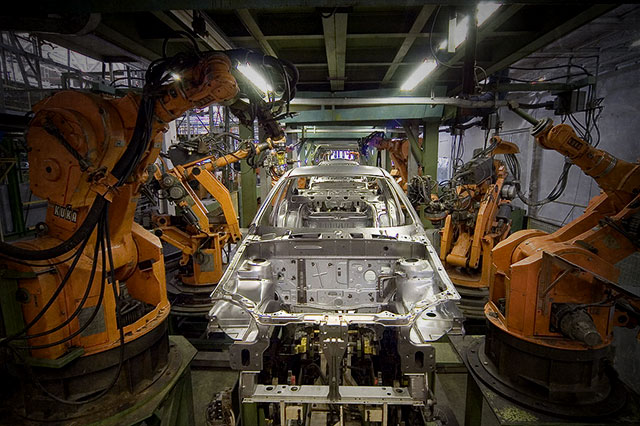
Did you know that Truthout is a nonprofit and independently funded by readers like you? If you value what we do, please support our work with a donation.
We are at a crossroads that will determine our economic future. There is hope, but also the possibility of a turn into a state of oligarchical barbarism, Frase postulates. The following is an excerpt from the introduction to Four Futures.
Why, the reader might ask, is it even necessary to write another book about automation and the postwork future? The topic has become an entire subgenre in recent years; Brynjolfsson and McAfee are just one example. Others include Ford’s Rise of the Robots and articles from the Atlantic’s Derek Thompson, Slate’s Farhad Manjoo, and Mother Jones’s Kevin Drum. Each insists that technology is rapidly making work obsolete, but they flail vainly at an answer to the problem of making sure that technology leads to shared prosperity rather than increasing inequality. At best, like Brynjolfsson and McAfee, they fall back on familiar liberal bromides: entrepreneurship and education will allow us all to thrive even if all of our current work is automated away.
The one thing missing from all these accounts, the thing I want to inject into this debate, is politics, and specifically class struggle. As Mike Konczal of the Roosevelt Institute has pointed out, these projections of a postwork future tend toward a hazy technocratic utopianism, a “forward projection of the Keynesian-Fordism of the past,” in which “prosperity leads to redistribution leads to leisure and public goods.” Thus, while the transition may be difficult in places, we should ultimately be content with accelerating technological development and reassure ourselves that all will be for the best in the best of all possible worlds.
This outlook ignores the central defining features of the society we currently live in: capitalist class and property relations. Who benefits from automation, and who loses, is ultimately a consequence not of the robots themselves, but of who owns them. Hence it is impossible to understand the unfolding of the ecological crisis and developments in automation without understanding a third crisis through which both are mediated, the crisis of the capitalist economy. For neither climate change nor automation can be understood as problems (or solutions) in and of themselves. What is so dangerous, rather, is the way they manifest themselves in an economy dedicated to maximizing profits and growth, and in which money and power are held in the hands of a tiny elite.
The growing inequality of wealth and income in the world has become an increasing focus of attention from activists, politicians, and pundits. Occupy Wall Street struck a chord with the slogan “we are the 99 percent,” drawing attention to the fact that almost all the gains from economic growth in recent decades have accrued to 1 percent or less of the population. Economist Thomas Piketty scored an improbable best seller with Capital in the Twenty-First Century, a massive treatise about the history of wealth and the prospect of an increasingly unequal world.
The two crises I’ve described are fundamentally about inequality as well. They are about the distribution of scarcity and abundance, about who will pay the costs of ecological damage and who will enjoy the benefits of a highly productive, automated economy. There are ways to reckon with the human impact on the Earth’s climate, and there are ways to ensure that automation brings material prosperity for all rather than impoverishment and desperation for most. But those possible futures will require a very different kind of economic system than the one that became globally dominant by the late twentieth century.
Copyright (2016) by Peter Frase. Not to be reposted without permission of the publisher, Verso Books.
Press freedom is under attack
As Trump cracks down on political speech, independent media is increasingly necessary.
Truthout produces reporting you won’t see in the mainstream: journalism from the frontlines of global conflict, interviews with grassroots movement leaders, high-quality legal analysis and more.
Our work is possible thanks to reader support. Help Truthout catalyze change and social justice — make a tax-deductible monthly or one-time donation today.
